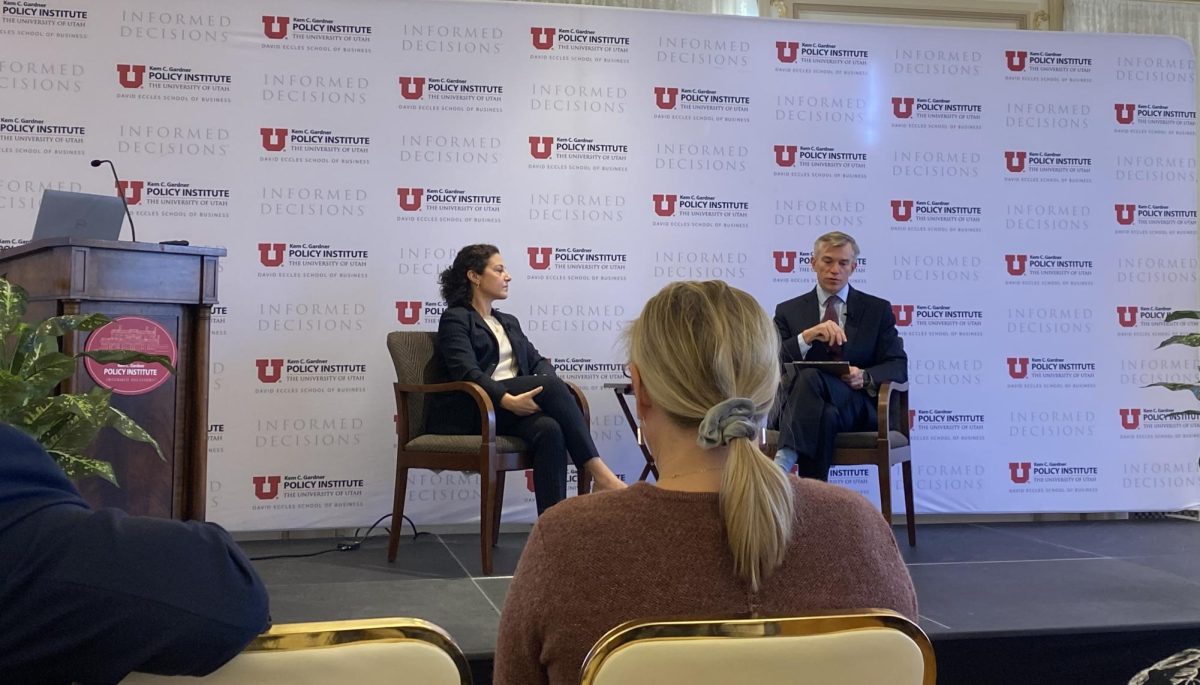Marriages in the United States are on the decline.
In the last 50 years in the U.S., the rate of marriage has decreased by close to 60%.
In her new book, Dr. Melissa Kearney discusses the impact and future of marriage in the U.S., and what that means for the children in those households.
Kearney, professor of economics at the University of Maryland, spoke at an event put on by the Kem C. Gardner Policy Institute on Wednesday about the economics of marriage. She recently released a book called “The Two-Parent Privilege: How Americans Stopped Getting Married and Started Falling Behind.”
The book focuses on research on the economic benefits of two-parent households for children. Kearney’s research mainly focuses on the large number of single mothers in the country, as they greatly outpace single fathers.
The event was held at the Thomas S. Monson Center and is a part of the Gardner Institute’s monthly Newsmaker Breakfast series.
The Event
As an economist, Kearney said that she wanted to look into this topic more deeply, in a numbers-driven study and book. The book looks into reasons why the decline in the institution of marriage has significant impacts on the economy and on families in the U.S.
A press release for the event detailed some of the statistics surrounding single mothers in the U.S.
“Almost half of all babies born in the U.S. were born to unmarried women in 2019, a dramatic increase since 1960, when only 5% of births were to unmarried mothers,” the release read. “This trend is not a direct result of divorce; today’s unpartnered mothers are more likely never to be married.”
A Pew research study found that 23% of U.S. children live in single-parent households, which is the highest rate in the world.
Kearney said that the focus of her book is to not shame single parents, but to take an empathic look at what influences single-parent households, and what changes can be done to be better for the children.
A major question that was answered during the event are the causes of the rise in children being born out of wedlock. Kearney said that women who have less education are far more likely to have children outside marriage than those who are college-educated. She ascribed it to a “lack of choices.”
She also said that through the decades, she has seen a change in attitudes.
“Women are more likely to see men as less reliable breadwinners, and men are less likely to see themselves as financially capable or eager to commit to taking care of a family,” she said. “Women also realized that they could bring in more money or the same amount of money as men and so the imperative or incentive to get married in these groups has decreased.”
Some of the benefits that Kearney mentioned for children in stable, two-parent households included more resources as well as a higher likelihood that the child will finish education milestones such as graduating from high school and higher education.
While some people say that marriage is an antiquated institution that is no longer the norm in this country, Kearny pushes back.
“We can’t really give up on the benefits of a two-parent home for kids born to non-college-educated parents,” she said. “Furthermore, I don’t see how a government check or program is ever going to make up for all of the resources and benefits second parents bring into the home.”
Representative Melissa Ballard was in attendance at the event, and she proposed a call to action. She encouraged officials to acknowledge the value of having a parent stay at home, as well as putting more value on a trade as an alternative to a college education.
“We need the universities to promote this equitable option for our students to know that this matters, that relationships matter,” she said. “For the children to understand the importance of healthy relationships and resolving concerns with dignity, respect and the interest and engagement and making marriage matter and relationships matter.”
She also encouraged the University of Utah to take a stand and run a campaign supporting the institution of marriage.
The next Newsmaker Breakfast will be held on Dec. 14. The topic is to be announced.



